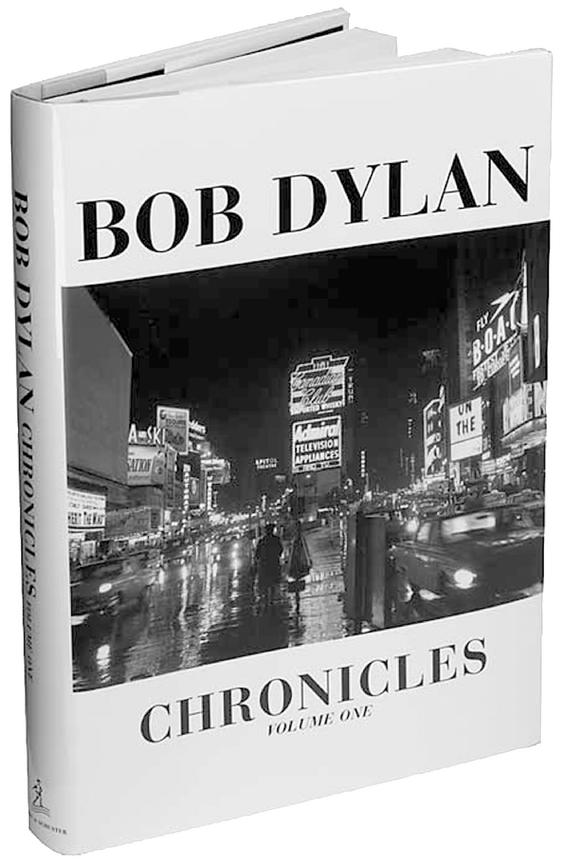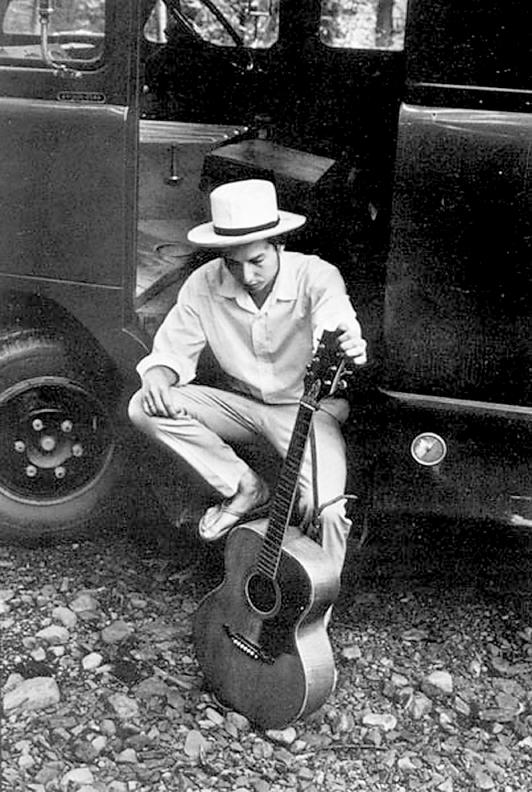I don't blame the authors—not entirely anyway—because I know from personal experience that writing anything intelligent about Dylan is damn near impossible. It's hard to transcend the standard boilerplate platitudes that regularly reduce descriptions of the man and his music to banal clichés.
How do you go about explaining why these songs have such a mysterious occult influence on people? You can't. I was born in 1970, long after Dylan made his primary impact on our culture, so the whole shtick about him being the conscience of his generation doesn't mean squat to me. Over all, I think analyses of Dylan's music suffer from this kind of cultural pigeon-holing. Those of us who actually listen to his music regularly know that his body of work defies any pat descriptions. It's impossible for most people to say just why they love his songs so much. I know I can't.
Chronicles is without a doubt the best book about Dylan I've ever read, and it's more than a bit shocking that the source is Dylan himself. No one could've hoped that his much-anticipated autobiography would be anything to write home about. Dylan's last attempt at printed prose, the inexplicable Tarantula, was tantalizing in its own weary way, but his decision not to release it back in the '60s was a wise one. As a work of literary art, it's largely a bucket of tortured, surrealistic vomit.
The truth is Tarantula didn't make any sense, which is a critique some people level at Dylan's songs. Even Dylan's most enigmatic songs, though, have an unmistakable mood about them. They suggest something coherent even if on a grammatical, technical level they can often seem utterly incoherent.
Tarantula, though, never achieved that kind of raw aesthetic power. It was largely a bunch of random snippets reminiscent of some of Dylan's freewheeling liner notes from his early days. As such, it didn't add up to much.
That's why Chronicles comes as such a pleasant surprise. I really don't think Dylanophiles could've asked for more. Actually, it's better than most of us ever could have imagined.
First of all, it's an extremely lucid book. Strikingly lucid, really, by Dylan standards. After years of being tortured by the public, Dylan long ago developed a crafty ability to keep his psyche shrouded from scrutiny. In Chronicles, he shines a flashlight into several dark corners of that psyche, and I think a lot of people will be surprised by what they see.
Still, the book is written by Bob Dylan, so if you're interested in a conventional autobiography that starts out with a sentence along the lines of “I was born in Duluth in the spring of 1941,” you'll be sorely disappointed. Like many of Dylan's songs, Chronicles approaches its subject matter from a skewed perspective. For one thing, he relates events in his fascinating career without adhering to any sort of conventional chronology. The book starts and ends in the early '60s, when he first arrived in New York City to try to make it as a folk singer. In between, he wedges two incongruous slices of memory—one from the early '70s, one from the early '80s.
The slice from the '70s deals with the period when he recorded the relatively obscure album New Morning. In this chapter, he talks with extraordinary candor about the curse of fame. Dylan's own personal curse has a particularly nasty flavor that no celebrity, not even Elvis or the Beatles, ever had the misfortune of tasting. Dylan's description of how he was hounded by his fans, the press and his enemies is one of the most heartbreaking passages in the whole book.
The slice from the late '80s gives a detailed account of the recording of the equally obscure Oh Mercy!. Dylan is much older now. He's remarried. His star, in his opinion, has passed. His honesty about his excruciating creative insecurities during this period is shocking coming from such a reclusive figure.
It might seem strange that Dylan has chosen to spend dozens of pages on some of the most obscure chapters of his life, while barely mentioning the more famous ones. It all makes perfect sense in execution, though, largely because the book is also extremely digressive—in a good way. This quality allows Dylan to touch on many of the key periods of his amazing life without dwelling needlessly on well-covered ground. We can assume that future volumes will fill in the gaps. It's a fascinating way to tell his story.
In a way, Chronicles is a natural extension of Dylan's songs. Both share the same cool humor and a similar cast of carnivalesque characters. The book is also a powerful reminder of Dylan's way with words as well as his eye for details, both physical and personal, in the world swirling around him. Like all of his best songs, Chronicles has a rough, raw, unfinished quality. Its grammatical blunders and occasional descents into gibberish are all part of the charm.
In two ways, Chronicles is also a very generous book. First off, Dylan is extremely kind toward other performers. He's not just eager to hand out praise. He also has a real knack for explaining just why a particular musician is so important. In another life he might have been a music critic. His passage about Roy Orbison is a prime example.
“With Roy,” he writes in a long digression about an Orbison song that had just come on the radio, “you didn't know if you were listening to mariachi or opera. He kept you on your toes. With him, it was all about fat and blood. He sounded like he was singing from an Olympian mountaintop and he meant business. One of his early songs, ’Ooby Dooby,' had been popular way previously, but this new song of his was nothing like that. ’Ooby Dooby' was deceptively simple, but Roy had progressed. He was now singing his compositions in three or four octaves that made you want to drive your car over a cliff. He sang like a professional criminal. Typically, he'd start out in some low, barely audible range, stay there a while and then astonishingly slip into histrionics. His voice could jar a corpse, always leave you muttering to yourself something like, ’Man, I don't believe it.'”
Dylan is also generous, I think, in sharing himself with his readers. Over the years, he's given a huge chunk of his flesh to the world in the form of his songs, and, as Chronicles makes painfully clear, he's paid a heavy price for it. Dylan doesn't have to give anything else. In my opinion, he's given plenty already.
Chronicles is intensely personal. It also provides genuine insight into the life and work of one of the greatest artists of our time. Who knew the crusty old bugger had it in him?










